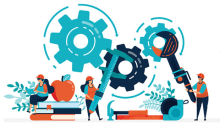The evolving perception of mental health at the workplace

The landscape of workplace wellness is evolving, and one significant shift in recent times is the increasing emphasis on mental health. These emerging trends underscore the recognition that mental well-being is finally receiving the attention it truly deserves in work environments worldwide.
Angela is a renowned architect whose journey not only defies industry norms but also champions mental well-being in a field where burnout and challenges often overshadow the accomplishments of professionals. In our conversation, she delved into what mental health means for her profession, and the vision that the industry - and in fact all organisations - should pursue going forward.
What is your perspective on promoting global mental health awareness within the demanding field of architecture?
Absolutely vital. Architecture creates the setting for our work, life, play, and healing- designing for mental health has to pervade design in all typologies. Within the profession, the mental health of employees designing these environments is equally important.
Architects design spaces for human use, and understanding human well-being, including mental health, can provide insights into creating more supportive, healing, and positive environments. Mental health issues are universal and don't adhere to geographical boundaries. A global advocacy approach ensures that architects, irrespective of their location, have access to resources, support, and an understanding community. Advocating for mental health in the field of architecture (or any demanding profession) isn't just a moral imperative; it makes practical sense. Ensuring the well-being of professionals can lead to better outcomes for projects, firms, and the communities they serve.
Why are mentors and supportive colleagues crucial to support employee well-being?
Mentors and colleagues provide a support network that is crucial to growth in the profession, providing emotional support, and creating a sense of belonging as well as purpose.
Employees often face challenges, uncertainties, and stressors in their roles. Having a mentor or supportive colleague provides them with a safe space to express their concerns, fears, and anxieties without judgment. Navigating the complexities of a job, especially for newcomers, can be daunting. Mentors, with their wealth of experience, provide invaluable guidance, helping proteges avoid potential pitfalls and offering solutions to challenges. Recognising and acknowledging an employee's efforts and achievements can significantly boost their confidence. Knowing that they have a supportive network allows employees to approach tasks with increased self-assuredness. Most important of all, supportive colleagues ensure that employees are integrated into the team, fostering a sense of belonging.
The influence of mentors and supportive colleagues on employee well-being cannot be understated. These relationships play a foundational role in establishing a nurturing, collaborative, and positive work environment, with tangible and intangible benefits for both the individual and the organisation. Mentors serve as role models. They demonstrate values, behaviors, and attitudes that contribute to a positive workplace culture.
How can fostering a culture of mental well-being and work-life balance alleviate and boost creativity?
According to Dr. Upali Nanda, PhD, HKS’ Global Practice Director, Research:
“In our work with the center for brain health, we have learned that the brain can be trained to work at its full potential, and the environments we design and work in can support it. Balancing the workday with time (and space) for focus, collaboration, ideation, social connection, and rest can foster a culture of cognitive health and creativity. The brain needs gyms just like the body does- so we would argue that designing, charretting, ideating with new partners and doing purposeful work can help mental well-being just as much as taking the right amount of breaks and cognitive resets can.”
What is your vision for a more inclusive, mentally healthy architecture community?
One where we stop doing commoditised work, work in an engaged way with diverse stakeholders, and work effectively, and creatively- rather than long hours of wasteful work. The transition from authoritative leadership to a more collaborative model. Encourage open dialogues where everyone, irrespective of their experience, has a voice. Rather than a top-down approach, implement mentorship programs where senior professionals can guide juniors without enforcing a strict hierarchy.
How has the perception of mental health in the workplace evolved in your organisation in recent years?
We have proactively created an environment where burnout, stress, anxiety, depression etc are supported. People are encouraged to take care of their mental health just like their physical health. Sabbaticals are offered to employees when needed. More importantly, we do not want to be reactive to this challenge.
Our organisation embarked on a partnership with the Center for Brainhealth and piloted the Brainhealthy Workplace. We are committed to paying as much attention to the human brain as we do to the body, to create a workplace, policy and technology where employees can work to their full potential. In fact, we have already seen in our pilots 32 point increase in BrainHealth Index for employees who do the training and engage in brainhealthy workplace habits.
What other trends do you see emerging in the way people talk, think, and act around mental health in the workplace?
The way mental health is approached in the workplace has witnessed a significant shift in recent years. With increasing awareness, many organisations and individuals have come to recognise its paramount importance. As we move forward, several emerging trends can be identified in how people talk, think, and act concerning mental health at work. Workplaces are beginning to offer training sessions that focus on understanding mental health issues, fostering empathy, and equipping employees with tools to handle stress, anxiety, and other challenges. The stigma around mental health is slowly dissipating. Employees and employers alike are becoming more open to discussing mental health challenges, fostering an environment of understanding and support. Recognising that different groups (e.g., LGBTQ+ employees, racial and ethnic minorities, differently abled individuals) might face unique mental health challenges, organisations are increasingly offering tailored support services.
These trends demonstrate that mental health in the workplace is gaining the attention it deserves.















